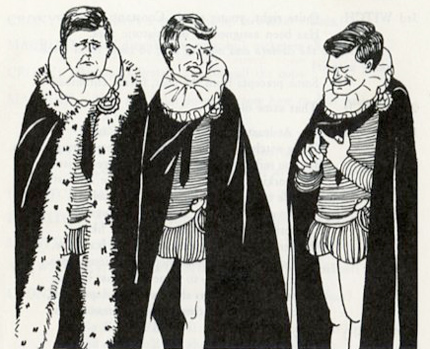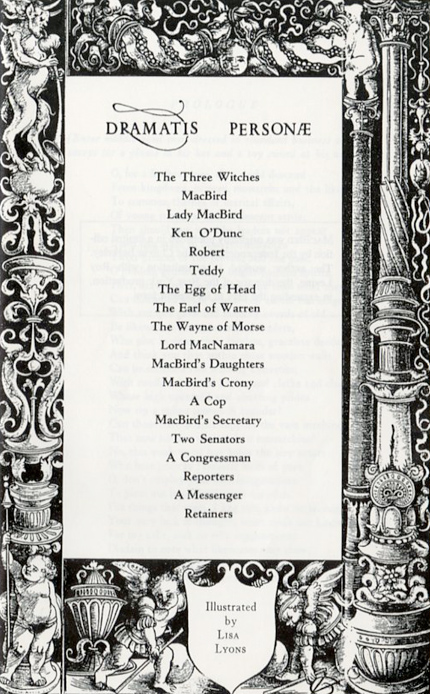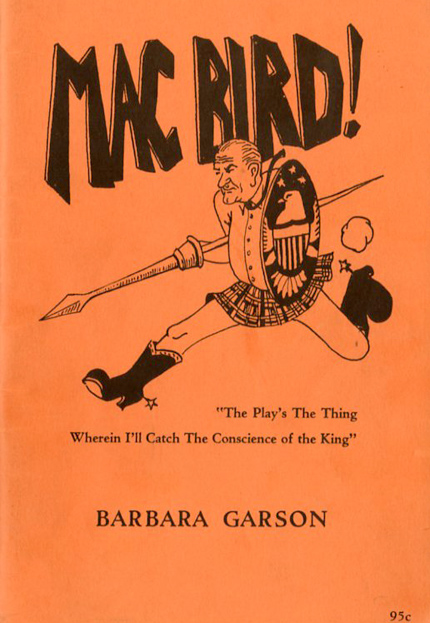
Illustration from the play MacBird
Funny, how events spark memories that have been forgotten. On the sad day that Ted Kennedy died I came across a tattered copy of MacBird, the 1966 play by Barbara Garson that accuses President Lyndon B. Johnson of being culpable in the John F. Kennedy assassination. At the time this ludicrous accusation seemed curiously plausible given the tenor of the times. Popular opinion had gone against LBJ owing to the unpopular Vietnam War triggering many weird conspiracy theories. But MacBird was not the run-of-the-mill lunatic fringe fantasy. It was the first post-Kennedy satire to receive serious public attention. Pulitzer Prize winning poet Robert Lowell wrote: “I have nothing to say about the political truth of this play, but I am sure a kind of genius has gone into the writing.” And Dwight MacDonald in the New York Review of Books said it was “The funniest, toughest-minded, and most ingenious political satire I’ve read in years.”
I was 16 1/2 years old when I first saw it at the Village Gate Theater on Bleecker Street in New York. I went with my parents and I can remember virtually every detail, as this was my first exposure to really biting (adult) anti-establishment political satire. It was also the first time I saw the, then young, actors Stacy Keach (MacBird), William Devane (Robert [Kennedy]), Rue McClanahan (Lady MacBird), John Pleshette (Ted [Kennedy]), and Cleavon Little (as the Muslim Witch). In this case a “Black Muslim” witch, the kind of which was scaring the bejesus out of white America. Some of you may remember the late Mr. Little was the African American marshal in Mel Brooks’ comic western Blazing Saddles. If only for the cast, many who went on to stellar careers, this was a historic theatrical experience, but the theme was heatedly controversial too.

Funny, how events spark memories that have been forgotten. On the sad day that Ted Kennedy died I came across a tattered copy of MacBird, the 1966 play by Barbara Garson that accuses President Lyndon B. Johnson of being culpable in the John F. Kennedy assassination. At the time this ludicrous accusation seemed curiously plausible given the tenor of the times. Popular opinion had gone against LBJ owing to the unpopular Vietnam War triggering many weird conspiracy theories. But MacBird was not the run-of-the-mill lunatic fringe fantasy. It was the first post-Kennedy satire to receive serious public attention. Pulitzer Prize winning poet Robert Lowell wrote: “I have nothing to say about the political truth of this play, but I am sure a kind of genius has gone into the writing.” And Dwight MacDonald in the New York Review of Books said it was “The funniest, toughest-minded, and most ingenious political satire I’ve read in years.”
I was 16 1/2 years old when I first saw it at the Village Gate Theater on Bleecker Street in New York. I went with my parents and I can remember virtually every detail, as this was my first exposure to really biting (adult) anti-establishment political satire. It was also the first time I saw the, then young, actors Stacy Keach (MacBird), William Devane (Robert [Kennedy]), Rue McClanahan (Lady MacBird), John Pleshette (Ted [Kennedy]), and Cleavon Little (as the Muslim Witch). In this case a “Black Muslim” witch, the kind of which was scaring the bejesus out of white America. Some of you may remember the late Mr. Little was the African American marshal in Mel Brooks’ comic western Blazing Saddles. If only for the cast, many who went on to stellar careers, this was a historic theatrical experience, but the theme was heatedly controversial too.

Cast list from the play MacBird illustrated by Lisa Lyons
MacBird, a send-up of Macbeth, was published three years after the Kennedy assassination, an event so psychically devastating that it was hard to believe back then that humor was not forever dead, in the same way it was said that irony died after 9/11. LBJ had less than two years remaining in his term and there was no indication that he would ultimately not seek re-election. It was a critical, tumultuous, and angry time.
MacBird, a send-up of Macbeth, was published three years after the Kennedy assassination, an event so psychically devastating that it was hard to believe back then that humor was not forever dead, in the same way it was said that irony died after 9/11. LBJ had less than two years remaining in his term and there was no indication that he would ultimately not seek re-election. It was a critical, tumultuous, and angry time.
MacBird was a full-dress Shakespearean costume “drama,” with Texan and Bostonian accents replacing the Bard’s English. The first act began at the 1960 Democratic National Convention, where in reality the powerful Senate Democrat leader LBJ sought to wrest the presidential nomination from the upstart JFK. In the scene, MacBird and Lady MacBird scheme to manipulate the selection of King. MacBird, however, looses to John Ken O’Dunc and as a consolation is named Viceroy (VP) — much to the consternation of Ken O’Dunc’s formidable clan.
3rd VOICE: They’ve shot the President!

ROBERT: Hail MacBird, Vice-president thou art —
That is, if you’ll accept the second place.
My brother Jack has picked you for the job
And hopes that you’ll agree to grace the slate.
That is, if you’ll accept the second place.
My brother Jack has picked you for the job
And hopes that you’ll agree to grace the slate.
MacBird happens upon three witches (sound similar to the sirens of Homer’s Odyssey or Oh Brother Where Art Thou?) who speak to him in riddles, urging him to become King by whatever means are necessary.
WITCHES: (chanting together)
The bosses shall be booted in the bin,
The kings unkinged. We have a world to win!
The bosses shall be booted in the bin,
The kings unkinged. We have a world to win!
MACBIRD: Vice-president — and President to be!
To make his fantasy reality MacBird, adroitly played by Keach who even looked identical to LBJ, invites Ken O’Dunc and kin to his ranch following the coronation. As this fateful event unfolds, Lady MacBird, who insistently complains of the dirty work she must endure as a Viceroy’s wife, finds an opportunity for MacBird to seize the throne and becomes the brains behind the coup.
To make his fantasy reality MacBird, adroitly played by Keach who even looked identical to LBJ, invites Ken O’Dunc and kin to his ranch following the coronation. As this fateful event unfolds, Lady MacBird, who insistently complains of the dirty work she must endure as a Viceroy’s wife, finds an opportunity for MacBird to seize the throne and becomes the brains behind the coup.
Following the real Dallas scenario, a procession is planned headed by Ken O’Dunc, followed by his brothers and lesser nobles of the court (i.e. its chief, the Earl of Warren). Unexpectedly, shots are fired — and I can still viscerally recall violently flinching in my seat.
ONE VOICE: He’s gone!
(Right after the shot is heard, a projector throws an X in a sixth floor window of the building, trajectory lines extend from the building to the side walk, lettering appears, reading “Grassy Knoll,” “Railroad Overpass,” etc. In this way the backdrop becomes a newspaper diagram of the assassination.)
3rd VOICE: They’ve shot the President!
5th VOICE: Oh, piteous sight!
The King is dead. And although the right of succession insures that Robert will be crowned, complications arise. The not so subtle implication leaves no doubt that MacBird was responsible for the deed. MacBird takes power but things go wrong and wronger with the war, race riots, and more. The witches return:
The King is dead. And although the right of succession insures that Robert will be crowned, complications arise. The not so subtle implication leaves no doubt that MacBird was responsible for the deed. MacBird takes power but things go wrong and wronger with the war, race riots, and more. The witches return:
WITCHES (all): Bubble and bubble, toil and trouble,
Burn baby burn, and cauldron bubble.
In the end MacBird realizes his greatest enemy is Robert (who in 1968 would run for president in the primaries against LBJ).
Burn baby burn, and cauldron bubble.
In the end MacBird realizes his greatest enemy is Robert (who in 1968 would run for president in the primaries against LBJ).
ROBERT: Your charm is curse. Prepare to hear the worst.
At each male birth my father in his wisdom
Prepared his sons for their envisaged greatness.
Our first gasped cries as moist, inverted infants
Confirmed for him our place as lords and leaders.
To free his sons from paralyzing scruples
And temper us for roles of world authority
Our pulpy human hearts were cut away.
And in their place, precision apparatus
Of steel and plastic tubing was inserted.
The sticky, humid blood was drained and then
A tepid antiseptic brine injected.
Although poor Teddy suffered complications,
The operations worked on all the others,
Thus steeling us to rule as more than men.
And so, MacBird, that very man you fear,
Your heartless, bloodless foe now lifts his spear.
At each male birth my father in his wisdom
Prepared his sons for their envisaged greatness.
Our first gasped cries as moist, inverted infants
Confirmed for him our place as lords and leaders.
To free his sons from paralyzing scruples
And temper us for roles of world authority
Our pulpy human hearts were cut away.
And in their place, precision apparatus
Of steel and plastic tubing was inserted.
The sticky, humid blood was drained and then
A tepid antiseptic brine injected.
Although poor Teddy suffered complications,
The operations worked on all the others,
Thus steeling us to rule as more than men.
And so, MacBird, that very man you fear,
Your heartless, bloodless foe now lifts his spear.
(ROBERT slowly raises and aims his spear, but before he can hurl it, MACBIRD clutches his heart.)
MACBIRD: My heart, my heart! (staggers)
Thus cracks a noble heart!
There are so many things that I now vividly recall from the viewing and reading of MacBird, not the least being the illustrated logo and the drawings that ran through the book (which incidentally sold over 200,000 copies in 1967). The hand lettered title “MacBird!” with a caricature of LBJ running with spear and shield in hand, wearing a veritable mini-skirt and cowboy boots with spurs, symbolized what many believed was his recklessness in Vietnam. Also, until that time most satire (other than Lenny Bruce) was held to certain standard of decorum. This play stripped off that civil façade.
MACBIRD: My heart, my heart! (staggers)
Thus cracks a noble heart!
There are so many things that I now vividly recall from the viewing and reading of MacBird, not the least being the illustrated logo and the drawings that ran through the book (which incidentally sold over 200,000 copies in 1967). The hand lettered title “MacBird!” with a caricature of LBJ running with spear and shield in hand, wearing a veritable mini-skirt and cowboy boots with spurs, symbolized what many believed was his recklessness in Vietnam. Also, until that time most satire (other than Lenny Bruce) was held to certain standard of decorum. This play stripped off that civil façade.

Cover of the play MacBird
As Macbeth and MacBird were tragic figures, so, in truth, was LBJ whose legacy was not his progressive civil rights legislation but his unreasonable prosecution of the war. Of course, Robert Kennedy was assassinated only two years after the play was published, although he lived long enough to fulfill Barbara Garson’s prescience with his run in the Democratic primaries against LBJ. And Teddy had myriad problems that prevented him from the ultimate envisaged greatness — the presidency — although his life as senator was extraordinary and significant.
I find it odd that I would find this book after four decades on the very day that Ted Kennedy died. But there is usually a reason for everything. This made me realize that it is important to take heed of hope and build upon it, there are just too many forces conspiring against it. Let’s “lift aloft the banner of MacBird.”
